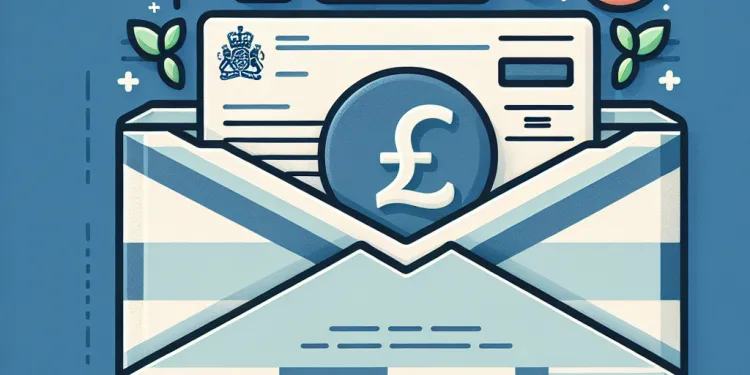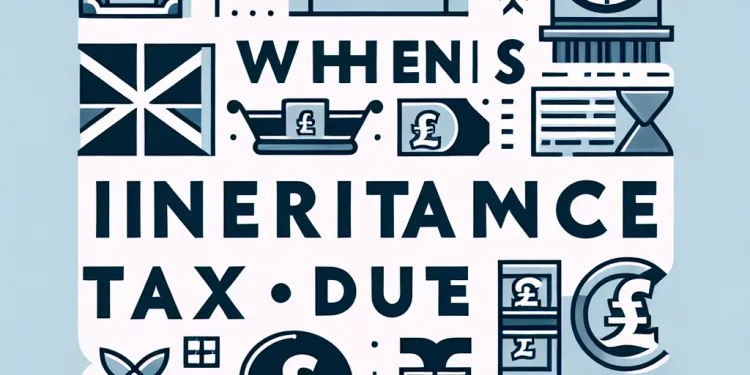
Find A Professional
More Items From Ergsy search
-

Do unpaid tax debts affect Inheritance Tax calculations?
Relevance: 100%
-

Is the tax refund amount taxable?
Relevance: 92%
-

How does inheritance tax affect non-UK domiciled individuals?
Relevance: 87%
-

How can I plan efficiently to mitigate inheritance tax?
Relevance: 85%
-

Can my tax refund be applied to my future tax obligations?
Relevance: 84%
-

Would a wealth tax replace other taxes in the UK?
Relevance: 84%
-

Does owning property abroad affect UK inheritance tax?
Relevance: 84%
-

How does a wealth tax differ from an income tax?
Relevance: 83%
-

Where can I find more detailed information on inheritance tax?
Relevance: 80%
-

What is inheritance tax in the UK?
Relevance: 79%
-

What is the wealth tax in the UK?
Relevance: 78%
-

Could a wealth tax encourage tax avoidance?
Relevance: 76%
-

How is the tax refund amount calculated?
Relevance: 75%
-

When is inheritance tax due to be paid?
Relevance: 73%
-

What Happens to Tax Debt After Death? (UK Laws)
Relevance: 73%
-

How will dividend taxation change in April 2026?
Relevance: 72%
-

What is inheritance tax in the UK?
Relevance: 71%
-

Can an inheritance tax bill be challenged or appealed?
Relevance: 70%
-

Higher Income Tax - How to Claim Pension Tax Relief | Extra 20% Boost
Relevance: 70%
-

What is the Wealth Tax in the UK?
Relevance: 70%
-

Can a wealth tax be levied annually?
Relevance: 68%
-

How might these changes affect taxpayers on PAYE?
Relevance: 68%
-

Are firefighter pension benefits taxable?
Relevance: 67%
-

What is the role of an executor in handling tax debts?
Relevance: 67%
-

HMRC Tax Refund letters
Relevance: 66%
-

Is there any inheritance tax exemption for spouses or civil partners?
Relevance: 66%
-

What are the HMRC income tax changes coming into effect in April 2026?
Relevance: 65%
-

How is a wealth tax typically calculated?
Relevance: 65%
-

Are there any countries currently implementing a wealth tax?
Relevance: 65%
-

What should business owners expect from income tax changes in 2026?
Relevance: 65%
-

How do I claim my tax refund from HMRC?
Relevance: 64%
-

Are there any planned changes to tax bands for April 2026?
Relevance: 64%
-

What happens if I do not claim my tax refund?
Relevance: 64%
-

Are these grants taxable?
Relevance: 64%
-

Would a wealth tax apply to foreign assets?
Relevance: 63%
-

Can a wealth tax impact economic behavior?
Relevance: 62%
-

How might a wealth tax affect wealthy individuals?
Relevance: 61%
-

Do I need to keep my tax refund letter for future reference?
Relevance: 61%
-

Are there different types of hip implants?
Relevance: 61%
-

What is a Wealth Tax?
Relevance: 61%
Understanding Inheritance Tax in the UK
Inheritance Tax (IHT) is a tax on the estate of someone who has died, including all property, possessions, and money. In the UK, the standard Inheritance Tax rate is 40% on anything above the £325,000 threshold. However, this can be reduced to 36% if 10% or more of the estate is left to charity. Planning efficiently can help mitigate the inheritance tax burden while ensuring your assets are distributed according to your wishes.
Utilizing the Nil Rate Band and Residence Nil Rate Band
The Nil Rate Band (NRB) allows you to pass on up to £325,000 without incurring IHT. Additionally, the Residence Nil Rate Band (RNRB) can provide an extra allowance if your home is left to your direct descendants. For the 2023/24 tax year, this additional threshold is £175,000. Combining these can potentially reduce the taxable value of your estate significantly. Both the NRB and RNRB can be transferred to your spouse or civil partner if unused upon your death.
Making Use of Annual Exemptions and Gifts
Utilizing annual exemptions is a key strategy in inheritance tax planning. Each tax year, you can give away up to £3,000 worth of gifts without them being added to the value of your estate. You can also carry one year’s unused annual exemption forward. In addition, small gifts up to £250 can be given to as many individuals as you like. Gifts in consideration of marriage or civil partnership also qualify for exemptions, ranging from £1,000 to £5,000, depending on your relationship with the recipient.
Establishing Trusts
Trusts are a sophisticated method to manage wealth for future generations while mitigating IHT. By placing assets into a trust, you can potentially remove them from your estate, reducing its taxable value. However, it's crucial to seek professional advice when setting up a trust, as the rules are complex and there may be implications, such as the 10-yearly charge on certain trusts.
Leaving a Charitable Legacy
Another effective strategy is leaving a portion of your estate to charity. Not only do charitable donations reduce the size of your taxable estate, but if you leave 10% or more of your net estate to charity, the IHT rate on the taxable portion of your estate reduces from 40% to 36%. This can be a beneficial way of supporting causes you care about while easing the tax burden.
Seeking Professional Advice
Inheritance Tax planning can be complex, and it is advisable to seek guidance from a professional such as a financial adviser or estate planner. They can provide personalized strategies to ensure that your estate is structured in the most tax-efficient way, taking into account the latest legal and fiscal developments. A well-thought-out plan can safeguard your wealth and ensure peace of mind for you and your beneficiaries.
Understanding Inheritance Tax in the UK
Inheritance Tax is a tax you pay when someone dies. It is on everything they own, like houses, things, or money. In the UK, if the things left behind are worth more than £325,000, you pay 40% tax on the extra. If you give 10% or more to charity, the tax is 36%. Planning can help you pay less tax and ensure your things go to who you want.
Using the Nil Rate Band and Residence Nil Rate Band
The Nil Rate Band lets you pass on £325,000 without paying tax. The Residence Nil Rate Band gives more if you leave your home to children or grandchildren. In 2023/24, this extra is £175,000. You and your partner can share these if one of you dies without using them.
Using Annual Exemptions and Gifts
You can give away some money each year without tax. Each year, you can give away £3,000. If you don’t use last year’s, you can add it too. You can also give small gifts up to £250 to anyone. Gifts for weddings can be free from tax too, like £1,000 to £5,000, depending on who it is for.
Setting Up Trusts
Trusts help plan for the future and might help pay less tax. Putting things in a trust means they might not count for tax. But it is important to ask an expert for help because trusts can be tricky and have extra charges.
Leaving a Gift to Charity
Giving to charity can help lower your tax. If you leave 10% or more of what’s left after tax to charity, the tax could go from 40% to 36%. It helps causes you care about and makes the tax less.
Getting Expert Help
Inheritance Tax can be difficult to understand. It’s a good idea to talk to an expert like a financial adviser. They can help you make a plan that fits your needs and keeps up with the law. This way, you can protect your money and make sure it goes where you want.
Frequently Asked Questions
What is inheritance tax?
Inheritance tax is a tax on the estate of someone who has died, including all property, possessions, and money.
How can I minimize inheritance tax liabilities?
You can minimize inheritance tax through estate planning strategies such as making gifts, setting up trusts, and utilizing life insurance policies.
What is a trust and how can it help with inheritance tax?
A trust is a legal arrangement where a trustee holds assets for beneficiaries. It can help mitigate inheritance tax by removing assets from the estate or directing how they are distributed.
Can gifting reduce inheritance tax?
Yes, gifting assets within certain limits can reduce the value of your estate and subsequently lower inheritance tax liabilities.
What is the annual gift tax exclusion?
The annual gift tax exclusion is the amount you can give each year to any number of people without incurring a gift tax or using your lifetime gift tax exemption.
What is the lifetime gift tax exemption?
The lifetime gift tax exemption is the total amount you can give away during your lifetime without incurring a federal gift tax. This amount is linked to the federal estate tax exemption.
How do life insurance policies help with inheritance tax?
Proceeds from life insurance policies are generally not considered part of the taxable estate if they are owned by an irrevocable life insurance trust, thus avoiding inheritance tax.
What is the spousal exemption?
The spousal exemption allows estates to pass to a surviving spouse tax-free, ensuring the estate is not taxed until it is passed on to other beneficiaries.
How does a legal will influence inheritance tax?
A well-drafted will can help ensure that estate planning strategies, like those for inheritance tax mitigation, are properly executed.
What is the role of an estate planner?
An estate planner can help devise strategies to manage your assets and minimize taxes, ensuring your estate is handled according to your wishes.
Are there state-specific inheritance taxes?
Yes, some states have their own inheritance or estate taxes, which can be in addition to federal taxes.
When is inheritance tax due?
Inheritance tax is typically due within six to nine months after the death of the estate owner, depending on jurisdiction.
How are charitable donations beneficial for inheritance tax?
Donating to qualified charities can reduce the taxable estate, as these donations are often exempt from inheritance tax.
Can retirement accounts affect inheritance tax?
Yes, the handling of retirement accounts like IRAs or 401(k)s can influence inheritance tax, especially regarding the designated beneficiaries.
What is a QTIP trust?
A Qualified Terminable Interest Property (QTIP) trust allows you to provide for a surviving spouse while deferring estate tax until the spouse’s death.
Can setting up a family limited partnership help mitigate inheritance tax?
Yes, a family limited partnership (FLP) may offer tax advantages by allowing you to transfer assets to family members with reduced tax impact.
What is 'generation-skipping' tax?
The generation-skipping tax (GST) applies to transfers of property to beneficiaries at least two generations younger than the donor, but specific strategies can mitigate its impact.
Can home equity affect my inheritance tax situation?
Yes, the value of your home is part of your estate, but strategies like downsizing or equity release can help manage its impact on inheritance tax.
Is international inheritance taxed the same way?
International inheritance can be subject to different tax rules. It’s important to understand the laws in the countries involved and consider tax treaties that may provide relief.
What happens if no inheritance plan is in place?
Without an inheritance plan, your estate may not be distributed according to your wishes, and beneficiaries may face higher tax obligations.
What is inheritance tax?
Inheritance tax is money you pay on things you get when someone dies. This can be money, a house, or things they owned.
If you want help, ask someone you trust to explain. You can also use pictures or charts to understand better.
Inheritance tax is money you pay on what a person who has died leaves behind. This can be things like houses, belongings, and money.
How can I pay less inheritance tax?
You can use some tools to help:
- Make a will: A will says who gets your things and money.
- Give gifts: You can give some money or things to people before you pass away.
- Trusts: You can put your money in a trust for your family.
Get help from a tax expert or financial adviser. They can explain what to do.
You can pay less inheritance tax by planning. Here are some ways to do it:
- Give gifts to your family and friends. This can lower the amount of money people pay tax on.
- Create a trust. This is a way to keep your things safe and can help save on taxes.
- Use life insurance. This can help give money to your family without paying too much tax.
If you find it hard to understand, you can ask someone for help, like a family member or a financial guide. There are also tools like talking devices or software that can read the text out loud for you.
What is a trust and how can it help with inheritance tax?
A trust is a way to keep money or things safe for someone.
It can help when someone dies and leaves things to family and friends.
Using a trust can make taxes smaller when giving things to others.
For help, you can ask an adult or use easy reading guides.
A trust is a way to keep and look after things like money or property for someone else. The person in charge is called a trustee. They hold and take care of the things for the people called beneficiaries. Trusts can help reduce taxes when someone dies because they can take things out of their belongings or choose how to give them out.
Can giving gifts lower the tax when someone dies?
Do you want to know if giving gifts can help lower the money paid to the government when a person dies? This is sometimes called a "dead person's tax" or "inheritance tax".
Here is an easy way to understand:
- When someone dies, the government takes some money from what they leave behind. This is called a tax.
- Sometimes, people want to give away their money or things before they die. They do this by giving gifts.
- Giving gifts while you are alive can sometimes mean you pay less tax later.
If you want to understand more, use these ideas:
- Ask someone you trust to help explain, like a friend or family member.
- Use pictures or drawings to help you understand better.
- Find a simple guide or watch a video about giving gifts and tax.
Yes, giving things away can make your estate smaller. This means you might pay less tax when someone inherits your things after you pass away.
What is the gift tax limit each year?
The annual gift tax exclusion is the amount of money you can give each year to as many people as you want. You won't have to pay a gift tax or use up your lifetime gift tax exemption for these gifts.
What is the lifetime gift tax exemption?
The lifetime gift tax exemption is a rule about giving money or things to people. It says how much you can give away without paying extra money to the government.
If you give a lot of money or things to someone, you might have to pay a tax. But with this rule, you can give a large amount over your lifetime without any tax.
Helpful tools:
- Calculator: Use a calculator to help you count how much you have given away.
- Ask for help: Talk to someone who knows about money rules, like an accountant or a tax helper.
The lifetime gift tax exemption is the most money you can give to others without paying a special gift tax. It is connected to another tax called the federal estate tax.
How can life insurance help with paying inheritance tax?
Money from a life insurance policy usually does not get taxed after someone dies if the policy is owned by a special kind of trust called an "irrevocable life insurance trust." This helps avoid paying inheritance tax.
What Is the Spousal Exemption?
The spousal exemption is a rule. It means when a person dies, their husband or wife won’t have to pay taxes on the things they inherit. ‘Inherit’ means to get things like money, a house, or a car when someone dies.
This rule is there to help people who lose their partners. They don’t have to worry about tax right away.
If you find it hard to understand, you can ask a trusted adult or friend to explain. Drawing pictures or using online videos might help too.
The spousal exemption helps when someone passes away. It lets everything go to their husband or wife without paying tax. This way, the tax is only paid when it goes to other family or friends later.
How does a legal will change the tax on money or things you leave when you die?
A legal will is a paper that says who gets your money and things after you die. It can help make sure the right people get what you want to give them, and it can also change how much tax they have to pay. This tax is called inheritance tax.
To understand better, you can:
- Talk to a helper, like a family member or a friend.
- Use simple words to ask questions to a professional who knows about wills and taxes.
- Make a list of what you own and who you want to give it to.
- Look at pictures or videos that explain inheritance tax.
A good will can help make sure your plans for your things and money, like saving on taxes, are done the right way.
What does an estate planner do?
An estate planner helps you decide what will happen to your things, like money and property, when you are not here anymore. They make sure your wishes are written down clearly.
Here are some tools that can help:
- Visual Aids: Use pictures or diagrams to explain your ideas.
- Checklists: Make a list to keep track of what you need to do.
- Simple Questions: Ask simple questions to make sure you understand.
An estate planner is someone who helps you make a plan for your things and money. They make sure your things go where you want when you are not around. They also help you save on taxes. This way, everything happens the way you want.
You can use pictures or drawings to help understand your plan. You can ask a family member or friend to explain things to you. Taking notes can also help you remember important details.
Do different states have their own rules for taxes on money and things inherited from someone?
Yes, some states have their own taxes when someone dies. These are called inheritance or estate taxes. These are extra taxes on top of national taxes.
When do you need to pay inheritance tax?
You usually have to pay inheritance tax 6 to 9 months after a person dies. The time can be different depending on where you live.
How do gifts to charities help with inheritance tax?
If you give money to special charities, it can lower the amount of taxes you have to pay when you pass away. This is because these gifts usually don't get taxed.
Do retirement savings change the tax on money you leave behind?
Yes, how you use accounts for retirement, like IRAs or 401(k)s, can affect the tax on money you leave to others when you pass away. This is important for the people you choose to give your money to.
What is a QTIP Trust?
A QTIP Trust is a special way to help your family with money after you pass away.
Here's how it works:
- When you die, money goes into a QTIP Trust for your husband or wife.
- Your husband or wife can use this money while they are alive.
- When they pass away, the rest of the money usually goes to your children.
This trust helps make sure your family is taken care of.
To understand more, you can:
- Ask a family member to help explain.
- Use pictures or drawings to see how it works.
- Talk to a trusted adult or a lawyer for more help.
A QTIP trust is a special way to help your husband or wife after you pass away. It also lets you delay paying certain taxes until after your husband or wife passes away too.
Can a family limited partnership help reduce inheritance tax?
Yes, a family limited partnership (FLP) can help you pay less tax. It lets you give things like money or property to your family and pay less tax.
What is 'generation-skipping' tax?
"Generation-skipping" tax is a type of tax. It is for when money or property is given to someone who is much younger, like grandchildren. This tax makes sure that people pay taxes even if they skip giving things to their children and give them to their grandchildren instead.
If you find this hard to understand, you can use a picture or chart to help explain it. You can also ask someone to read it with you and explain each part.
The generation-skipping tax (GST) is a tax you pay when giving property to someone who is two generations younger, like your grandchildren. But there are ways to lower this tax.
Will my home's value change the inheritance tax I pay?
Yes, your home is part of what you own. This is called your estate.
There are ways to make sure your family pays less tax when you leave them your home.
Two ways to do this are:
- Selling your home and buying a smaller one. This is called downsizing.
- Borrowing money from the value of your home. This is called equity release.
These can help with taxes when you pass your home to your family.
Do other countries have the same rules for taxes on things you inherit?
When someone dies and leaves you money or things from another country, there can be special tax rules. It's good to learn about the laws in each country involved. Sometimes, there are agreements between countries to help with taxes.
What if there is no plan for who gets your things?
If you don't have a plan for who gets your things after you pass away, your things might not go to the people you want. Also, the people who get your things might have to pay more money in taxes.
Useful Links
- Ergsy carfully checks the information in the videos we provide here.
- Videos shown by Youtube after a video has completed, have NOT been reviewed by ERGSY.
- To view, click the arrow in centre of video.
- Most of the videos you find here will have subtitles and/or closed captions available.
- You may need to turn these on, and choose your preferred language.
- Go to the video you'd like to watch.
- If closed captions (CC) are available, settings will be visible on the bottom right of the video player.
- To turn on Captions, click settings .
- To turn off Captions, click settings again.
More Items From Ergsy search
-

Do unpaid tax debts affect Inheritance Tax calculations?
Relevance: 100%
-

Is the tax refund amount taxable?
Relevance: 92%
-

How does inheritance tax affect non-UK domiciled individuals?
Relevance: 87%
-

How can I plan efficiently to mitigate inheritance tax?
Relevance: 85%
-

Can my tax refund be applied to my future tax obligations?
Relevance: 84%
-

Would a wealth tax replace other taxes in the UK?
Relevance: 84%
-

Does owning property abroad affect UK inheritance tax?
Relevance: 84%
-

How does a wealth tax differ from an income tax?
Relevance: 83%
-

Where can I find more detailed information on inheritance tax?
Relevance: 80%
-

What is inheritance tax in the UK?
Relevance: 79%
-

What is the wealth tax in the UK?
Relevance: 78%
-

Could a wealth tax encourage tax avoidance?
Relevance: 76%
-

How is the tax refund amount calculated?
Relevance: 75%
-

When is inheritance tax due to be paid?
Relevance: 73%
-

What Happens to Tax Debt After Death? (UK Laws)
Relevance: 73%
-

How will dividend taxation change in April 2026?
Relevance: 72%
-

What is inheritance tax in the UK?
Relevance: 71%
-

Can an inheritance tax bill be challenged or appealed?
Relevance: 70%
-

Higher Income Tax - How to Claim Pension Tax Relief | Extra 20% Boost
Relevance: 70%
-

What is the Wealth Tax in the UK?
Relevance: 70%
-

Can a wealth tax be levied annually?
Relevance: 68%
-

How might these changes affect taxpayers on PAYE?
Relevance: 68%
-

Are firefighter pension benefits taxable?
Relevance: 67%
-

What is the role of an executor in handling tax debts?
Relevance: 67%
-

HMRC Tax Refund letters
Relevance: 66%
-

Is there any inheritance tax exemption for spouses or civil partners?
Relevance: 66%
-

What are the HMRC income tax changes coming into effect in April 2026?
Relevance: 65%
-

How is a wealth tax typically calculated?
Relevance: 65%
-

Are there any countries currently implementing a wealth tax?
Relevance: 65%
-

What should business owners expect from income tax changes in 2026?
Relevance: 65%
-

How do I claim my tax refund from HMRC?
Relevance: 64%
-

Are there any planned changes to tax bands for April 2026?
Relevance: 64%
-

What happens if I do not claim my tax refund?
Relevance: 64%
-

Are these grants taxable?
Relevance: 64%
-

Would a wealth tax apply to foreign assets?
Relevance: 63%
-

Can a wealth tax impact economic behavior?
Relevance: 62%
-

How might a wealth tax affect wealthy individuals?
Relevance: 61%
-

Do I need to keep my tax refund letter for future reference?
Relevance: 61%
-

Are there different types of hip implants?
Relevance: 61%
-

What is a Wealth Tax?
Relevance: 61%